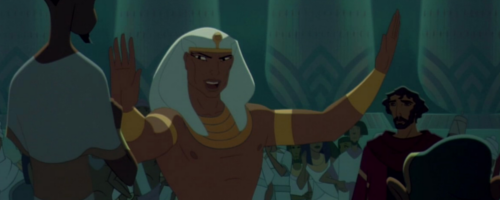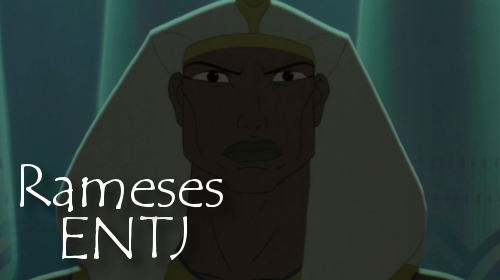ENTJ, The Commander, The Field-Marshall, The Trailblazer
Rameses is a pretty classic ENTJ movie villain, fulfilling all the traits that the movies need out of their ENTJs—ambitious, relentless, intelligent, and lacking remorse. He’s not a terribly good person to write about for a post coming out on Christmas Eve. If it helps, you can go back and read about a more healthy and loveable ENTJ, the Scarecrow from The Wizard of Oz. You can also re-read the first entries of this Prince of Egypt series, beginning with Moses—who happens to be Rameses’ mirror, reversing his letters (ISFP) and flipping the order of his cognitive functions.
No wonder these two clashed.
Dominant Function: Te/Extraverted Thinking, “Organize the Experience”
 Rameses is in it to win. Even in a boyish, just-for-fun chariot race, he reminds his younger brother of their hierarchy: “Second born! Second best!” He blames Moses for always getting him into trouble and making him look bad.
Rameses is in it to win. Even in a boyish, just-for-fun chariot race, he reminds his younger brother of their hierarchy: “Second born! Second best!” He blames Moses for always getting him into trouble and making him look bad.
He bristles at his father’s criticism that he’s foolish and irresponsible. Given new responsibility, Rameses takes charge of constructing a new temple and builds it bigger and better. He finds great pleasure in his accomplishments.
When Moses kills a slave master, Rameses offers to make it so that it never happened. “I am the morning and the evening star!” he recites. “If I say it, it will be done!”
Many years later, when Moses returns, Rameses has built up the kingdom of Egypt to great heights. His father’s criticism stings him even later in life, though, welling up when Rameses shouts that he will not be the weak link. He fears failure.
He’s not about to bend his will to Moses’ newfound God, either. Like his father before him, he sees the Hebrew slaves as nothing more than a means to an end. He increases their workload in response to Moses’ plea for freedom, and looks to the priests to disprove his brother’s “tricks.” It takes the battering of the Ten Plagues for him to change his mind, and even then, it’s more of an emotional decision.
Once the Hebrews have left, Rameses pulls it back together and leads his army against them.
It does not go as planned.
Auxiliary Function: Ni/Introverted Intuition, “Anticipate the Experience”
 “Last night, the gods granted me a vision,” Rameses says when he takes over the temple’s reconstruction. He sees a new temple, bigger and grander than the original. He tells Moses that their misadventure, which ruined the temple in the first place, was a kind of blessing in disguise, leading to this new opportunity.
“Last night, the gods granted me a vision,” Rameses says when he takes over the temple’s reconstruction. He sees a new temple, bigger and grander than the original. He tells Moses that their misadventure, which ruined the temple in the first place, was a kind of blessing in disguise, leading to this new opportunity.
Rameses places high value on achieving more than the generations before him. “An Egypt greater than that of my father,” is what he says when Moses asks him what he sees when he looks out at his kingdom. A repeat of the profile shot of Seti from earlier in the movie shows bigger statues and grander buildings than we saw before.
Rameses had a vision, and has worked to realize it. It doesn’t seem fair to him this new God should want to take it away. He also doesn’t foresee the Hebrews and their God winning this battle, since this power is beyond his comprehension. The Plagues become a variable he doesn’t know what to do with, upsetting all his plans.
Tertiary Function: Se/Extraverted Sensing, “Experience the Experience”
 Rameses can be just as impulsive as his younger brother, and obviously loves a thrilling chariot race or a good prank. He takes great pride in the grandness and luxury of his kingdom. He’s ready to fight and take action against the escaping Hebrews, and charges into the Red Sea in spite of the dangers.
Rameses can be just as impulsive as his younger brother, and obviously loves a thrilling chariot race or a good prank. He takes great pride in the grandness and luxury of his kingdom. He’s ready to fight and take action against the escaping Hebrews, and charges into the Red Sea in spite of the dangers.
Inferior Function: Fi/Introverted Feeling, “Evaluate the Experience”
 Rameses still feels warmly towards Moses after all these years, but he won’t let that affect his judgment.
Rameses still feels warmly towards Moses after all these years, but he won’t let that affect his judgment.
As Pharaoh, he follows only his goals and ambition, and doesn’t consider the ethics and morality of what he does to accomplish them. He seethes and fumes when criticized or confronted, internalizing it until he eventually lashes out. When Moses gives back the ring Rameses presented to him as a gift many years ago, he takes the insult personally. He ignores the suffering the Plagues inflict on his people until the Tenth Plague hits home, killing his own firstborn son.
His decision to release the Hebrews after that is an angry, bitter, and sullen one. He recants it immediately once he returns to his senses—or, in this case, his dominant Extraverted Thinking function. Rameses’ whole pursuit of the Hebrews, however, seems driven by his deep, inner, personal sense of hurt pride.
